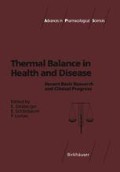Abstract
Antidiuretic Hormone (ADH) is known to act in the control of water balance. Further it has a great potential as endogenous antipyrogen (1) and is implicated in learning processes. In patients with diencephalic lesions, diabetes insipidus (DI) is a common symptom, which can easily be treated by MinirinR (desmopressinacetate) substitution. However, a disturbed water balance with hypohydration does not only affect circulation and the homeostasis of blood electrolytes, but also heat dissipation processes (2), which are clinically difficult to diagnose and to describe. The aim of our study was, to investigate the thermoregulatory capabilities of patients with central DI in a hot environment. Besides physiological interests, especially the clinician must be aware of all the functional aspects of a lacking ADH when treating or operating upon these patients.
Access this chapter
Tax calculation will be finalised at checkout
Purchases are for personal use only
Preview
Unable to display preview. Download preview PDF.
References
Kasting, N W (1982): Vasopressin: A homeostatic effector in the febrile process. Neurosci. & Biobehavioral Reviews, Vol. 6, 215–222
Senay, L C (1979): Temperature regulation and hypohydration: A singular view. J. Appl. Physiol. 47, 1, 1–7
Behr, R, Hildebrandt, G, Koca, M, Brück, K (1991): Modifications of thermoregulatory characteristics in patients with suprasellar pituitary adenomas. Brain 114, H, 697–708
Ramanathan, N L (1964): A new weighting system for mean surface temperatures of the human body. J. Appl. Physiol. 19, 531–533
Brück, K, Zeisberger, E (1990): Adaptive changes in thermoregulation and their neuropharmacologies basis. In: Thermoregulation Physiology and Biochemistry, International Encyclopedia of Pharmacology and Therapeutics, 255–307. Eds: Schönbaum, E, Lomax, P, Pergamon Press, 1990
Hensel, H, Brand, S (1977): 6-Plate element for recording of cutaneous blood flow. Pflügers Arch., 368, 165–167
Hessemer, V, Brück, K (1985): Influence of menstrual cycle on shivering, skin blood flow and sweating responses measured at night. J. Appl. Physiol. 59, 6,1902–1910
Roddie, IC (1983): Circulation to skin and adipose tissue. In: Handbook of Physiology, Vol. 3, Sec. 2, 285–317. Hrsg.: Shepherd, J T, Abboud, F M, Geiger, S R, Am. Physiol. Soc., Bethesda, 1983
Brengelmann, G L, Freund, P R, Rowell, L B, Oleru J E, Kraning, K K (1981): Absence of active cutaneous vasodilation associated with congenital absence of sweat glands in humans. Am. J. Physiol., 240, H 571–H 575
Fortney, S M, Nadel, E R, Wenger, C B, Bove, J R (1981): Effect of blood volume on sweating rate and body fluids in exercising humans. J. Appl. Physiol.: Resp. Envir. Exercise Physiol. 51, 1594–1600
Taussig, L M, Braunstein, G D (1973): Effects of vasopressin on sweat rate and composition in patients with diabetes insipidus and normal controls. L. Investig. Dermatol. 60, 4,197–202
Luerssen, T G, Shelton, R L, Robertson, G L (1977): Evidence for seperate origin of plasma and cerebrospinal fluid vasopressin. Cin. Res. 25, 14.
Author information
Authors and Affiliations
Editor information
Editors and Affiliations
Rights and permissions
Copyright information
© 1994 Birkhäuser Verlag Basel
About this chapter
Cite this chapter
Behr, R., Dietrich, C., Brück, K. (1994). Alteration of Heat Dissipation by Diabetes Insipidus in Humans. In: Zeisberger, E., Schönbaum, E., Lomax, P. (eds) Thermal Balance in Health and Disease. APS Advances in Pharmacological Sciences. Birkhäuser Basel. https://doi.org/10.1007/978-3-0348-7429-8_35
Download citation
DOI: https://doi.org/10.1007/978-3-0348-7429-8_35
Publisher Name: Birkhäuser Basel
Print ISBN: 978-3-0348-7431-1
Online ISBN: 978-3-0348-7429-8
eBook Packages: Springer Book Archive

